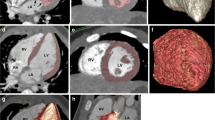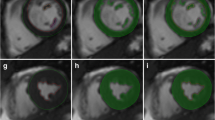Abstract
The purpose of our study was to evaluate reliability of left ventricular (LV) function and mass quantification in cardiac DSCT exams comparing manual contour tracing and a region-growing-based semiautomatic segmentation analysis software. Thirty-three consecutive patients who underwent cardiac DSCT exams were included. Axial 1-mm slices were used for the semiautomated technique, and short-axis 8-mm slice thickness multiphase image reconstructions were the basis for manual contour tracing. Left ventricular volumes, ejection fraction and myocardial mass were assessed by both segmentation methods. Length of time needed for both techniques was also recorded. Left ventricular functional parameters derived from semiautomatic contour detection algorithm were not statistically different from manual tracing and showed an excellent correlation (p<0.001). The semiautomatic contour detection algorithm overestimated LV mass (180.30±44.74 g) compared with manual contour tracing (156.07±46.29 g) (p<0.001). This software allowed a significant reduction of the time needed for global LV assessment (mean 174.16±71.53 s, p<0.001). Objective quantification of LV function using the evaluated region-growing-based semiautomatic segmentation analysis software is feasible, accurate, reliable and time-effective. However, further improvements are needed to equal results achieved by manual contour tracing, especially with regard to LV mass quantification.


Similar content being viewed by others
References
White HD, Norris RM, Brown MA, Brandt PW, Whitlock RM, Wild CJ (1987) Left ventricular end-systolic volume as the major determinant of survival after recovery from myocardial infarction. Circulation 76(1):44–51
Hammermeister KE, DeRouen TA, Dodge HT (1979) Variables predictive of survival in patients with coronary disease. Selection by univariate and multivariate analyses from the clinical, electrocardiographic, exercise, arteriographic, and quantitative angiographic evaluations. Circulation 59(3):421–430
Buck T, Hunold P, Wentz KU, Tkalec W, Nesser HJ, Erbel R (1997) Tomographic three-dimensional echocardiographic determination of chamber size and systolic function in patients with left ventricular aneurysm: comparison to magnetic resonance imaging, cineventriculography, and two-dimensional echocardiography. Circulation 96(12):4286–4297
Bavelaar-Croon CD, Kayser HW, van der Wall EE, de Roos A, Dibbets-Schneider P, Pauwels EK et al (2000) Left ventricular function: correlation of quantitative gated SPECT and MR imaging over a wide range of values. Radiology 217(2):572–575
Lipton MJ, Farmer DW, Killebrew EJ, Bouchard A, Dean PB, Ringertz HG et al (1985) Regional myocardial dysfunction: evaluation of patients with prior myocardial infarction with fast CT. Radiology 157(3):735–740
Bellenger NG, Burgess MI, Ray SG, Lahiri A, Coats AJ, Cleland JG et al (2000) Comparison of left ventricular ejection fraction and volumes in heart failure by echocardiography, radionuclide ventriculography and cardiovascular magnetic resonance; are they interchangeable? Eur Heart J 21(16):1387–1396
Pennell DJ, Sechtem UP, Higgins CB, Manning WJ, Pohost GM, Rademakers FE et al (2004) Clinical indications for cardiovascular magnetic resonance (CMR): Consensus Panel report. Eur Heart J 25(21):1940–1965
Sandstede J, Lipke C, Beer M, Hofmann S, Pabst T, Kenn W et al (2000) Age-and gender-specific differences in left and right ventricular cardiac function and mass determined by cine magnetic resonance imaging. Eur Radiol 10(3):438–442
Natori S, Lai S, Finn JP, Gomes AS, Hundley WG, Jerosch-Herold M et al (2006) Cardiovascular function in multi-ethnic study of atherosclerosis: normal values by age, sex, and ethnicity. AJR Am J Roentgenol 186(6 Suppl 2):S357–S365
Myerson SG, Bellenger NG, Pennell DJ (2002) Assessment of left ventricular mass by cardiovascular magnetic resonance. Hypertension 39(3):750–755
Garcia MJ, Lessick J, Hoffmann MH (2006) Accuracy of 16-row multidetector computed tomography for the assessment of coronary artery stenosis. JAMA 296(4):403–411
Mahnken AH, Koos R, Katoh M, Spuentrup E, Busch P, Wildberger JE et al (2005) Sixteen-slice spiral CT versus MR imaging for the assessment of left ventricular function in acute myocardial infarction. Eur Radiol 15(4):714–720
Cury RC, Nieman K, Shapiro MD, Nasir K, Cury RC, Brady TJ (2007) Comprehensive cardiac CT study: evaluation of coronary arteries, left ventricular function, and myocardial perfusion-is it possible? J Nucl Cardiol 14(2):229–243
Schlosser T, Mohrs OK, Magedanz A, Voigtlander T, Schmermund A, Barkhausen J (2007) Assessment of left ventricular function and mass in patients undergoing computed tomography (CT) coronary angiography using 64-detector-row CT: comparison to magnetic resonance imaging. Acta Radiol 48(1):30–35
Grude M, Juergens KU, Wichter T, Paul M, Fallenberg EM, Muller JG et al (2003) Evaluation of global left ventricular myocardial function with electrocardiogram-gated multidetector computed tomography: comparison with magnetic resonance imaging. Invest Radiol 38(10):653–661
Juergens KU, Grude M, Maintz D, Fallenberg EM, Wichter T, Heindel W et al (2004) Multi-detector row CT of left ventricular function with dedicated analysis software versus MR imaging: initial experience. Radiology 230(2):403–410
Schlosser T, Pagonidis K, Herborn CU, Hunold P, Waltering KU, Lauenstein TC et al (2005) Assessment of left ventricular parameters using 16-MDCT and new software for endocardial and epicardial border delineation. AJR Am J Roentgenol 184(3):765–773
Flohr TG, McCollough CH, Bruder H, Petersilka M, Gruber K, Suss C et al (2006) First performance evaluation of a dual-source CT (DSCT) system. Eur Radiol 16(2):256–268
Johnson TR, Nikolaou K, Wintersperger BJ, Leber AW, von Ziegler F, Rist C et al (2006) Dual-source CT cardiac imaging: initial experience. Eur Radiol 16(7):1409–1415
Scheffel H, Alkadhi H, Plass A, Vachenauer R, Desbiolles L, Gaemperli O et al (2006) Accuracy of dual-source CT coronary angiography: First experience in a high pre-test probability population without heart rate control. Eur Radiol 16(12):2739–2747
Achenbach S, Ropers D, Kuettner A, Flohr T, Ohnesorge B, Bruder H et al (2006) Contrast-enhanced coronary artery visualization by dual-source computed tomography-initial experience. Eur J Radiol 57(3):331–335
Manzke R, Koken P, Hawkes D, Grass M (2005) Helical cardiac cone beam CT reconstruction with large area detectors: a simulation study. Phys Med Biol 50(7):1547–1568
Blobel J, Baartman H, Rogalla P, Mews J, Lembcke A (2003) Spatial and temporal resolution with 16-slice computed tomography for cardiac imaging. Fortschr Röntgenstr 175(9):1264–1271
Mahnken AH, Muhlenbruch G, Koos R, Stanzel S, Busch PS, Niethammer M et al (2006) Automated vs. manual assessment of left ventricular function in cardiac multidetector row computed tomography: comparison with magnetic resonance imaging. Eur Radiol 16(7):1416–1423
Mühlenbruch G, Das M, Hohl C, Wildberger JE, Rinck D, Flohr TG et al (2006) Global left ventricular function in cardiac CT. Evaluation of an automated 3D region-growing segmentation algorithm. Eur Radiol 16(5):1117–1123
Flohr TG, Stierstorfer K, Ulzheimer S, Bruder H, Primak AN, McCollough CH (2005) Image reconstruction and image quality evaluation for a 64-slice CT scanner with z-flying focal spot. Med Phys 32(8):2536–2547
Bland JM, Altman DG (1986) Statistical methods for assessing agreement between two methods of clinical measurement. Lancet 1(8476):307–310
Lin LI (1989) A concordance correlation coefficient to evaluate reproducibility. Biometrics 45(1):255–268
van der Vleuten PA, Willems TP, Gotte MJ, Tio RA, Greuter MJ, Zijlstra F et al (2006) Quantification of global left ventricular function: comparison of multidetector computed tomography and magnetic resonance imaging. a meta-analysis and review of the current literature. Acta Radiol 47(10):1049–1057
Belge B, Coche E, Pasquet A, Vanoverschelde JL, Gerber BL (2006) Accurate estimation of global and regional cardiac function by retrospectively gated multidetector row computed tomography: comparison with cine magnetic resonance imaging. Eur Radiol 16(7):1424–1433
Salm LP, Schuijf JD, de Roos A, Lamb HJ, Vliegen HW, Jukema JW et al (2006) Global and regional left ventricular function assessment with 16-detector row CT: comparison with echocardiography and cardiovascular magnetic resonance. Eur J Echocardiogr 7(4):308–314
Sugeng L, Mor-Avi V, Weinert L, Niel J, Ebner C, Steringer-Mascherbauer R et al (2006) Quantitative assessment of left ventricular size and function: side-by-side comparison of real-time three-dimensional echocardiography and computed tomography with magnetic resonance reference. Circulation 114(7):654–661
Leschka S, Wildermuth S, Boehm T, Desbiolles L, Husmann L, Plass A et al (2006) Noninvasive coronary angiography with 64-section CT: effect of average heart rate and heart rate variability on image quality. Radiology 241(2):378–385
Wintersperger BJ, Nikolaou K, von Ziegler F, Johnson T, Rist C, Leber A et al (2006) Image quality, motion artifacts, and reconstruction timing of 64-slice coronary computed tomography angiography with 0.33-second rotation speed. Invest Radiol 41(5):436–442
Schroeder S, Kopp AF, Kuettner A, Burgstahler C, Herdeg C, Heuschmid M et al (2002) Influence of heart rate on vessel visibility in noninvasive coronary angiography using new multislice computed tomography: experience in 94 patients. Clin Imaging 26(2):106–111
Gleichmann U, Fassbender D, Trieb G, Mannebach H, Ohlmeier H (1982) The influence of beta-adrenoceptor antagonists with and without intrinsic sympathomimetic activity on local wall motion abnormalities in patients with coronary heart disease. Br J Clin Pharmacol 13(Suppl 2):301S–304S
Silke B, Verma SP, Frais MA, Reynolds G, Taylor SH (1986) Comparative effects of metoprolol and celiprolol on cardiac hemodynamics and left ventricular volume at rest and during exercise-induced angina. Clin Pharmacol Ther 39(1):5–14
Mahnken AH, Hohl C, Suess C, Bruder H, Muhlenbruch G, Das M et al (2006) Influence of heart rate and temporal resolution on left-ventricular volumes in cardiac multislice spiral computed tomography: a phantom study. Invest Radiol 41(5):429–435
Mahnken AH, Spuentrup E, Niethammer M, Buecker A, Boese J, Wildberger JE et al (2003) Quantitative and qualitative assessment of left ventricular volume with ECG-gated multislice spiral CT: value of different image reconstruction algorithms in comparison to MRI. Acta Radiol 44(6):604–611
Boese JM, Bahner ML, Albers J, van Kaick G (2000) Optimizing temporal resolution in CT with retrospective ECG gating. Radiologe 40(2):123–129
Mahnken AH, Bruder H, Suess C, Muhlenbruch G, Bruners P, Hohl C et al (2007) Dual-source computed tomography for assessing cardiac function: A phantom study. Invest Radiol 42(7):491–498
Boehm T, Alkadhi H, Roffi M, Willmann JK, Desbiolles LM, Marincek B et al (2004) Time-effectiveness, observer-dependence, and accuracy of measurements of left ventricular ejection fraction using 4-channel MDCT. Fortschr Röntgenstr 176(4):529–537
McCollough CH, Primak AN, Saba O, Bruder H, Stierstorfer K, Raupach R et al (2007) Dose performance of a 64-channel dual-source CT scanner. Radiology 243(3):775–784
Becker C, Schatzl M, Feist H, Bauml A, Schopf UJ, Michalski G et al (1999) [Assessment of the effective dose for routine protocols in conventional CT, electron beam CT and coronary angiography]. Fortschr Röntgenstr 170(1):99–104
Trabold T, Buchgeister M, Kuttner A, Heuschmid M, Kopp AF, Schroder S et al (2003) Estimation of radiation exposure in 16-detector row computed tomography of the heart with retrospective ECG-gating. Fortschr Röntgenstr 175(8):1051–1055
Yamamuro M, Tadamura E, Kanao S, Wu YW, Tambara K, Komeda M et al (2007) Coronary angiography by 64-detector row computed tomography using low dose of contrast material with saline chaser: influence of total injection volume on vessel attenuation. J Comput Assist Tomogr 31(2):272–280
Cademartiri F, Mollet N, van der Lugt A, Nieman K, Pattynama PM, de Feyter PJ et al (2004) Non-invasive 16-row multislice CT coronary angiography: usefulness of saline chaser. Eur Radiol 14(2):178–183
Gosse P (2005) Left ventricular hypertrophy as a predictor of cardiovascular risk. J Hypertens Suppl 23(1):S27–S33
Kahan T (1998) The importance of left ventricular hypertrophy in human hypertension. J Hypertens Suppl 16(7):S23–S29
Brown DW, Giles WH, Croft JB (2000) Left ventricular hypertrophy as a predictor of coronary heart disease mortality and the effect of hypertension. Am Heart J 140(6):848–856
Author information
Authors and Affiliations
Corresponding author
Rights and permissions
About this article
Cite this article
Bastarrika, G., Arraiza, M., Pueyo, J.C. et al. Quantification of left ventricular function and mass in cardiac Dual-Source CT (DSCT) exams: comparison of manual and semiautomatic segmentation algorithms. Eur Radiol 18, 939–946 (2008). https://doi.org/10.1007/s00330-007-0849-x
Received:
Revised:
Accepted:
Published:
Issue Date:
DOI: https://doi.org/10.1007/s00330-007-0849-x




